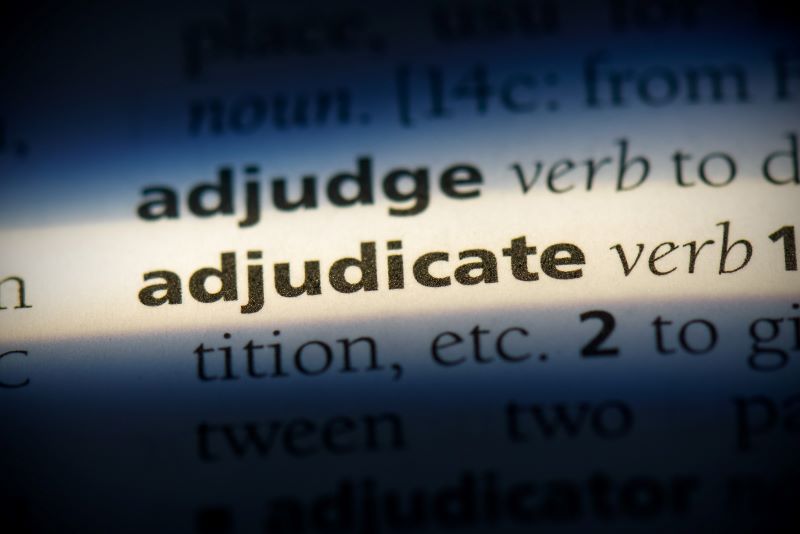3 min read
San Jacinto River Authority v. City of Conroe: Contract Claims Survive Immunity Plea
The San Jacinto River Authority entered into long-term water supply contracts with the City of Conroe and the City of...
A size protest is a formal objection lodged with the Small Business Administration (SBA) regarding the size status of a business competing for a contract reserved for small businesses. This administrative action enables small business entities to challenge the size classification of a competing bidder, as seen in the case of Harmonia Holdings Grp., LLC v. United States, 999 F.3d 1397. The SBA allows a broad spectrum of individuals and organizations to file a size protest when a procurement is designated for small businesses only, as highlighted in the SIZE APPEAL OF: Ross Aviation, Inc., Appellant; concerning USA Jet Airlines, Inc. Such protests must be specific to a given procurement and substantiated with concrete facts, as demonstrated in the SIZE APPEAL OF: Emergency Beacon Corporation, Appellant. Upon receiving a size protest, the SBA informs the contracting officer, the business under scrutiny, and the protesting party as outlined in § 121.1008 concerning the procedural steps following the receipt of a size protest or a formal size determination request. Protests should be submitted within five business days following the notification by the contracting officer of the prospective winner's identity, exemplified in the SIZE APPEAL OF: Glacier Technologies, LLC, Appellant against Dynamo Technologies, LLC; based on Size Determination No. 2-2023-013. Notably, SBA regulations accommodate the submission of size protests both "before or after" the awarding of a contract, as seen in the SIZE APPEAL OF: Red River Computer Co., Inc. Appellant; from Size Determination No. 1-SD-2013-12. In the context of long-term task or delivery order contracts, a size protest can be lodged under three specific circumstances: following the initial award of the long-term contract, post-exercise of an option, or upon a contracting officer's request for size re-certification for a specific order, as in the case of SIZE APPEAL OF: Odyssey Systems Consulting Group, Ltd. Appellant; against Millennium Engineering and Integration LLC; from Size Determination No. 2-2021-051-052. Should a protest be dismissed due to lack of specificity, an appeal may be pursued within fifteen days from the size determination receipt, as was the situation in the SIZE APPEAL OF: AOC Connect, LLC Appellant; against By Light Professional IT Services, LLC; based on Size Determination No. 02-2019-076. The process for determining size involves the SBA's Office of Government Contracting, which solicits information from the questioned business for evaluation, as seen in the SIZE APPEAL OF: Advanced Management Technology, Inc., Appellant.

A status protest initiates when either an interested party or the Small Business Administration (SBA) itself questions a business's eligibility for a certain program or contract. This formal objection needs to be documented in writing, outlining all the distinct reasons for the challenge. For example, such a protest might question if a business is truly at least 51% owned and controlled by one or more women who are U.S. citizens, or it might dispute the extent to which a prime contractor depends on a smaller subcontractor that doesn't meet the criteria of being a similarly-situated entity under the Women-Owned Small Business Program regulations. The SBA is empowered to scrutinize a business's credentials anytime, seek further details, and may infer negatively if there's no response to their inquiries. The goal in resolving a status protest is to confirm whether the business in question met the eligibility criteria both at the time of their bid or offer submission and at the contract award moment. The adjudication of such protests falls under the purview of the SBA's Office of Hearings and Appeals (OHA), which handles cases including, but not limited to, protests about Service-Disabled Veteran-Owned Small Business (SDVOSB) status for contracts issued by the U.S. Department of Veterans Affairs.

Businesses often turn to the SBA Office of Hearings and Appeals (OHA) for crucial adjudications, particularly when it comes to protests regarding the status of Service-Disabled Veteran-Owned Small Businesses (SDVOSBs). The OHA is empowered under specific statutes, notably 15 U.S.C. § 657f and 13 C.F.R. part 134 subpart J, to resolve disputes, as seen in cases like the protest by Protection Strategies, Inc. against ANASEC, Inc. for a U.S. Customs and Border Protection solicitation, and the joint protest by Beshenich Muir & Associates, LLC & ELB Services LLC against YKJY LLC related to a U.S. Department of the Air Force solicitation.
Moreover, the OHA's authority extends to reviewing SDVO status decisions as per 13 C.F.R. Part 125, exemplified in the appeal by Airborne Construction Services, LLC regarding a U.S. Department of Veterans Affairs solicitation. The OHA also holds the pivotal role of hearing appeals on size determinations, where its ruling stands as the SBA's final word unless overturned by the OHA itself, underlining the immediacy and permanence of its decisions as guided by § 121.1009 on size determination procedures.
It's pivotal to recognize that neglecting to present a case to the OHA not only misses a chance to rectify potential oversights by the agency but also deprives the parties involved—and potentially the courts—of the OHA's considerable expertise and experience. This oversight can lead to an insufficient record for judicial review, a scenario highlighted in Team Waste Gulf Coast, LLC v. United States, emphasizing the critical nature of engaging with the OHA's processes.

In the landscape of U.S. Federal law, navigating a bid protest versus appealing a decision with the Small Business Administration (SBA) represents two distinct pathways. A bid protest embodies a formal objection to the awarding or intended awarding of a federal contract, or to the specifications within a contract's solicitation. When embarking on a bid protest, courts approach the review of an agency's verdict with a high level of respect, particularly valuing the judgments made by the SBA's Office of Hearings and Appeals (OHA) thanks to the SBA's specialized administrative knowledge and its intimate understanding of the matter at hand, as seen in Obsidian Sols. Grp., LLC v. United States, 153 Fed. Cl. 334.
Conversely, lodging an appeal with the SBA presents a structured avenue for disputing a size determination handed down by an SBA Government Contracting Area Office. Such appeals are directed to the SBA's OHA and stand as an administrative step that must be undertaken prior to seeking a judicial review regarding a size determination in a courtroom setting, as showcased in Harmonia Holdings Grp., LLC v. United States, 999 F.3d 1397.
A crucial distinction between these two procedures lies in the necessity to first navigate through administrative channels. Specifically, for a bid protest, the party challenging the decision must typically pursue all available administrative remedies with the SBA before they can escalate the matter for judicial review of a size dispute, as illustrated in Harmonia Holdings Grp., LLC v. United States, 999 F.3d 1397. Not bringing your case to the SBA's Office of Hearings and Appeals (OHA) during a bid protest might lead to forfeiting certain arguments. This omission strips the agency of the chance to rectify its mistakes, a scenario depicted in Team Waste Gulf Coast, LLC v. United States, 135 Fed. Cl. 683.
On the other hand, within the context of an SBA appeal, the SBA holds the authority to revisit and amend a formal size determination to address any oversight or error. This is contingent upon the condition that no appeal has been lodged with the OHA and that the SBA Area Office or OHA has not issued a final decision, as outlined in 19.302 Protesting a small business representation or rerepresentation.
Furthermore, it's critical to recognize that the United States Court of Federal Claims possesses the authority to scrutinize an SBA size determination in both a bid protest scenario and other contract disputes under its purview, as evidenced in the case of 22nd Century Techs., Inc. v. United States, 57 F.4th 993.
To effectively challenge a solicitation with the Small Business Administration (SBA), timing is crucial. For sealed bid procurements, any entity or interested party must ensure their protest reaches the contracting officer by the end of the fifth business day following the opening of bids. In the case of negotiated procurements, the deadline extends to the close of business on the fifth business day after the contracting officer sends out a notification revealing the prospective winning bidder. Protests can initially be voiced orally, but they must be backed up in writing and land in the hands of the contracting officer within the designated 5-day timeframe. Alternatively, a written protest can be physically delivered, mailed, faxed, emailed, or sent via express or overnight delivery to the officer. Notably, protests submitted by either the contracting officer or the SBA are exempt from the timing rule and are considered timely regardless of when they are filed, whether before or after an award decision is made. Nonetheless, any protest arriving past these set deadlines is deemed late, with the sole exception for those filed by the contracting officer or SBA, underscoring the strict adherence to protocol in these matters.
To fortify a bid protest case within the U.S. Federal system, several crucial strategies stand out. Initially, the complainant is tasked with pinpointing any legal missteps in the Small Business Administration's (SBA) assessments, as outlined in USCS Claims Ct R 52.1, within the Administrative Record. A notable example being CR/ZWS LLC v. United States, where the motion for judgment was refused due to the plaintiff's inability to highlight legal misjudgments on part of the SBA, as seen in CR/ZWS LLC v. United States, 138 Fed. Cl. 212. Furthermore, it’s imperative for the complainant to prove either the illogical nature of the SBA’s conclusion or its breach of relevant procurement laws or regulations, detrimentally affecting the applicant, illustrated in Arcata Assocs. v. United States, 110 Fed. Cl. 290. The final piece involves the plaintiff demonstrating considerable detriment due to the alleged mistake. The court’s acknowledgment of an SBA error is not enough; the plaintiff must convincingly show substantial harm from such an oversight to succeed in their bid protest, as underscored in CR/ZWS LLC v. United States, 138 Fed. Cl. 212.
In the context of U.S. Federal acquisitions or sales, any bidder, offeror, or party with a vested interest can initiate a bid protest through the Small Business Administration (SBA) to challenge the small business designation of a competitor involved in a specific government transaction. This protest needs to be submitted to the contracting officer overseeing the transaction. To be considered timely, the protest must be filed before the end of business on the fifth day (excluding Saturdays, Sundays, and legal holidays) following the opening of bids or proposals. For negotiated transactions, the deadline to file a protest is within five business days, not counting weekends and legal holidays, after the contracting officer has notified of the offeror's identity in question, as demonstrated in the case SIZE APPEAL OF: ATE Associates, Inc. against Giordano Associates, Inc.
When a protest is lodged, the SBA's regional director or an authorized representative will notify the protested party of the protest and provide them with a copy of the protest documentation alongside a blank SBA Form 355. The party being protested must then fill out and submit this form to the SBA within three business days of receiving it, attaching a detailed response to the protest allegations and any supporting evidence. This procedure was observed in the SIZE APPEAL OF: Urgent Care Associates. Failure to submit the completed SBA Form 355 within the allotted timeframe, or an extended period if granted by the SBA for valid reasons, will lead the SBA to classify the protested entity as not meeting the criteria for a small business, as was the case in the SIZE APPEAL OF: Danco Moving and Storage.
IFurthermore, should a contracting officer encounter a protest regarding a small business's status, regardless of its timeliness, or if the officer themselves seeks to challenge the business size status of a bidder or contractor, they must quickly send the protest to the SBA Government Contracting Area Director. This director operates out of the Government Contracting Area Office located where the business in question has its main office. It's crucial that the protest is drafted in a clear, written format, outlining the reasons for the challenge, backed by precise and comprehensive evidence questioning the business's small size status. Any protest lacking clear, specific rationale will be outright dismissed by the SBA. Additionally, a detailed referral letter from the contracting officer, which includes information relevant to the solicitation under 19.302 for protesting a business's size status or its reaffirmation, must accompany the protest.
Get Started in
 Discuss Your Claim
Discuss Your Claim  Explore Your Options
Explore Your Options  We Will Advocate For You
We Will Advocate For You


Dec 18, 2025 by Joe Whitcomb
The San Jacinto River Authority entered into long-term water supply contracts with the City of Conroe and the City of...
Dec 8, 2025 by Joe Whitcomb
International Brotherhood of Electrical Workers, Local 278, along with a group of individual workers, filed an action...
Nov 27, 2025 by Joe Whitcomb
Matthew Shive entered into a membership agreement with 24 Hour Fitness USA, LLC, which granted him access to the...
Colorado
300 Union Boulevard
Suite 200
Lakewood, CO 80228
(303) 534-1958 (local)
© 2026 · All Rights Reserved · Whitcomb, Selinsky, PC